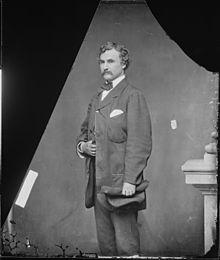Henry Winter Davis
| Henry Winter Davis | |
|---|---|
 |
|
| Member of the U.S. House of Representatives from Maryland's 3rd district |
|
|
In office March 4, 1863 – March 3, 1865 |
|
| Preceded by | Cornelius Lawrence Ludlow Leary |
| Succeeded by | Charles Edward Phelps |
| Member of the U.S. House of Representatives from Maryland's 4th district |
|
|
In office March 4, 1855 – March 3, 1861 |
|
| Preceded by | William Thomas Hamilton |
| Succeeded by | Henry May |
| Personal details | |
| Born |
August 16, 1817 Annapolis, Maryland, U.S. |
| Died | December 30, 1865 (aged 48) Baltimore, Maryland, U.S. |
| Political party |
American Party (1855–61) Radican Republican (1861–63) Unconditional Unionist (1863–65) |
| Alma mater |
Kenyon College University of Virginia |
| Religion | Episcopal |
Henry Winter Davis (August 16, 1817 – December 30, 1865) was a United States Representative from the 4th and 3rd congressional districts of Maryland, well known as one of the Radical Republicans during the Civil War.
Born in Annapolis, Maryland, his father, the Reverend Henry Lyon Davis (1775–1836), was a prominent Maryland Episcopal clergyman and was for some years president of St John's College at Annapolis. The son graduated at Kenyon College at Gambier, Ohio in 1837, and from the law department of the University of Virginia in 1841, and began the practice of law in Alexandria, Virginia, but in 1850 removed to Baltimore, Maryland, where he won a high position at the bar.
Davis was a man of scholarly tastes, an orator of unusual ability and great eloquence, tireless and fearless in fighting political battles, but impulsive to the verge of rashness, impractical, tactless and autocratic. He wrote an elaborate political work entitled The War of Ormuzd and Ahriman in the Nineteenth Century (1853), in which he described the American Republic and the Russian Empire as the ultimate opponents in the struggles of humanity; it also dismissed the Southern contention that slavery was a divine institution.
Early becoming imbued with strong anti-slavery views, though by inheritance he was himself a slaveholder, he began political life as a Whig. After the Whig Party disintegrated, he became a Know Nothing, and served as a member of the Know Nothing–influenced American Party in the House of Representatives from 1855 to 1861. By his independent course in Congress he won the respect and esteem of all political groups.
...
Wikipedia
